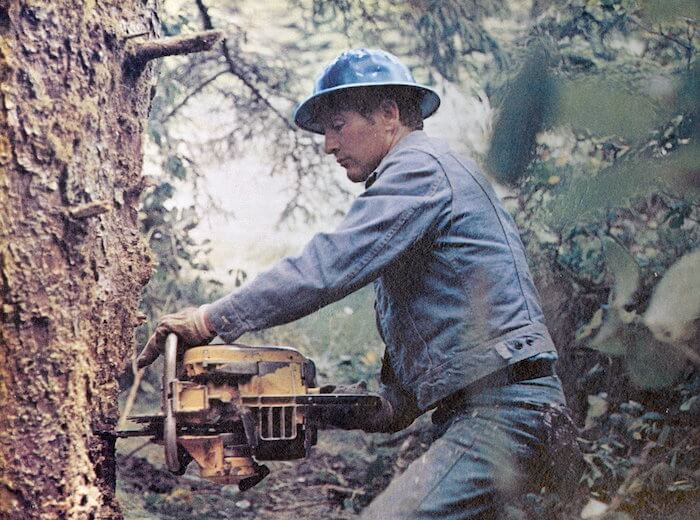

At work the following day, a log rolls loose and nearly hits Lee. While some of the townsmen attempt to appeal to Hank and Henry's decency, pleading with them to join the strike because the town will die while it drags on, others must be restrained from assaulting the Stamper men. Later, the family enters town to buy supplies. The work is dangerous and grueling, but as Lee struggles to learn from and keep up with the other men, he earns grudging respect from Hank, who is met with silence when he asks his brother why he really came back.

They stop to give a ride to Les Gibbons, a union man who informs them that at the upcoming Lumberman's Field Day picnic, the locals plan to beat up Hank. After a brief pause, Hank admonishes Henry to be kinder to Lee, but Henry calls the boy "a sissy." At the worksite, a few other Stamper cousins join the friendly work crew.

After Joe Ben, a born-again Christian, attempts to entice Lee to attend church, Lee points out that Viv and Jan refrain from speaking at meals. The women serve breakfast while the men banter, Henry voicing aloud his doubts that Lee can "make it" at the worksite. At 4:00 a.m., Henry noisily rouses the family. Despite Lee's assertion that he has come back to help Hank with the business, he bitterly informs his half-brother that his mother committed suicide, after which there was no one to help him or even attend her funeral. At night, Lee drinks too much and raves that after Henry left him and his mother, who was Henry's second wife, without a word, only Hank helped support them. Lee, who unlike his rural family has attended college, lived in cities and sports the long hair of a modern youth, gives no reason for his sudden return and is uncomfortable with his family. Henry's nephew, Joe Ben, who lives at the Stamper house with his wife Jan and their daughters along with Henry and Hank and his wife Viv, at first fails to recognize Lee, but soon welcomes him warmly. Soon after, Leeland Stamper, Henry's other son and Hank's half-brother, appears at the house after years of absence. Despite Draeger's appeals and veiled threats, the Stamper men remain cold and steadfast, further infuriating their neighbors.
First reviews of sometimes a great notion how to#
In response, Henry declares that, as the family has "worked for dogs for generations," no one can tell them how to run their business. Draeger appeals to their sense of community, asking them to hold their logs from the combine and sell them later to another company. One day, union president Jonathan Draeger arrives to speak to Henry, the family patriarch who wears an arm cast due to a recent accident, and his son Hank. When the Stamper family, who own an independent logging business, refuse to join the strikers, they are considered traitors by the locals. And you have to stand back in awe of the man's ability to create character.The logging town of Wakonda, Oregon has been thrown in economic despair because of the local union's strike against a large lumber combine. you cannot help but admire Kesey's vigor, his profligate command of the language. Set against the damp and brutal background of an Oregon logging community, the book by turns gasps, pants, whoops, and shrieks. Kesey in the fullness of his material discovers them for us." Beyond the PTA and the beer commercials, beyond the huge effluvium of the times, exist people who live by the ancient passions, and Mr. " Sometimes a Great Notion, a big book in every way, captures the tenor of the post-Korea America as nothing I can remember reading. When Kesey describes the Canada honkers flying over the woods you can almost see them when he describes the smells of the grass and the tastes of the strawberries you feel and you smell and you taste." and then there is that great gift for comedy, for purely sensational writing. Getting into this book is getting into a fascinating, crazy world of a fascinating, crazy family which has a throbbing reality and a desperate dedication to living. "As in Cuckoo's Nest, Kesey brings to life people you will never forget.


 0 kommentar(er)
0 kommentar(er)
